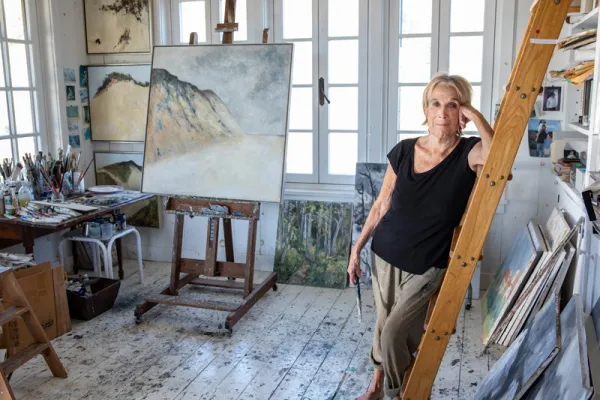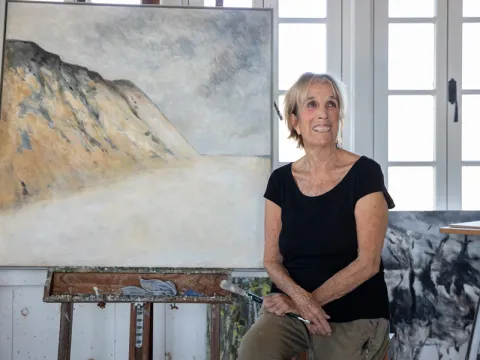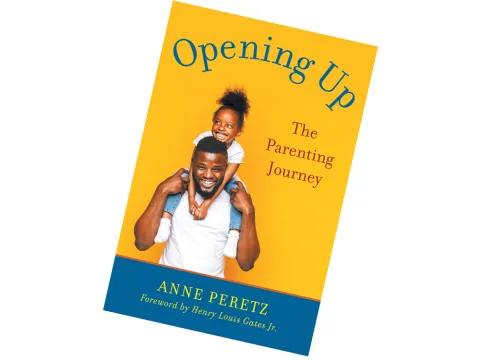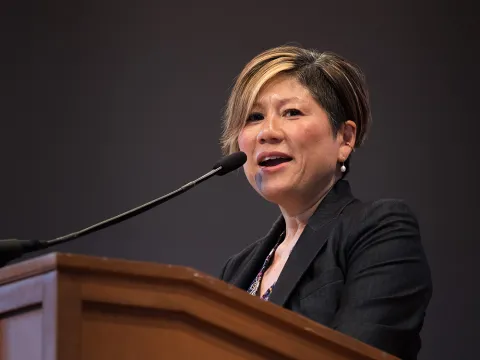We Are in This Together
Alumnae News
Anne Peretz ’60 has channeled her commitment to social justice into a unique therapeutic approach for helping at-risk families that transcends language and culture.

Published March 28, 2022
Anne Labouisse Peretz ’60 still has a painting she did when she was 8 years old. It is of a house her family owned in Connecticut—an anomaly, since they mostly lived in rentals because her father’s high-profile diplomatic positions necessitated moving constantly. “It’s always been in my blood somehow to make pictures,” she says.
But just as art has been a lifelong passion, so has social justice. To be honest, Peretz says, she feels a little “bifurcated.” For Peretz is not only a well-known painter whose landscapes are part of the permanent collections of the Metropolitan Museum of Art, the Bard College Hessel Museum of Art, and the Israel Museum; she is also a pioneering family therapist and the founder of Parenting Journey, an organization that has transformed the way therapists and social workers assist at-risk families.
Peretz tells her story in her book, Opening Up: The Parenting Journey, published last year with a forward by Henry Louis Gates Jr. Born to a life of privilege yet exposed to the horrors of war at a young age, she grew to be an activist with a desire to change the world, ultimately realizing that perhaps that could best be done one person—or one family—at a time.
Parenting Journey takes a unique therapeutic approach and breaks down the hierarchy between therapist and client, working from a “we’re all in this together” perspective. It recognizes that everyone has strengths, and it factors in societal influences such as poverty and racism. “We meet at the juncture of social justice, family therapy, and psychoeducation,” Peretz says. “That’s unusual. Either you’re carrying a banner for social justice, or you’re looking at the psychological roots of the trauma. I think we’ve incorporated both of these different areas.”
A Legacy of Service
Peretz grew up in “a privileged family with a social conscience.” Her parents met while volunteering at a New York City settlement house that provided services to the poor. Her mother, Elizabeth, died when Anne was just 6 years old. Her father, Henry Labouisse Jr., was an American diplomat who later held several positions at the United Nations. From 1954 to 1958, after Israel’s War of Independence, he led efforts to resettle nearly a million Arab refugees. When Peretz was in her early teens, her father took her on some of his working visits to the refugee camps. “His jobs all had the same message: Help those in need of help,” Peretz says. “This kind of work was his passion, and I felt the power of those visits deeply.”
To Paint or Not to Paint
As a student at Smith, Peretz’s compulsion to be of service and her desire to paint led her to change her major several times. “I thought: It’s nice that I like to paint,” she recalls, “but I have to do something serious with my life.” She bounced from philosophy to government before settling on studio art, studying under such notables as sculptor and graphic artist Leonard Baskin and social realist Mervin Jules. Jules was a fan of her work, Peretz says. “He was really my mentor. He told me I could be an artist.” Ultimately, she feels she chose the right major. “My training at Smith was fabulous!” she says.
What if changing the world could best be done one person—or one family—at a time?
Still, says Peretz, “All the time I was painting, I felt guilty that I was just dealing with surfaces when so many people were suffering.” In addition to being married to a U.S. Air Force doctor and having two children, Peretz was deeply involved in the civil rights and antiwar movements of the 1960s. (In 1967, she married second husband Marty Peretz—a former Harvard professor and longtime former publisher and editor-in-chief of The New Republic. They had two children and divorced in 2012. She is now married to attorney Martin Garbus.)
Peretz was disillusioned by what she saw as the limitations of activism and became drawn to working with individuals. In the early 1970s, she earned a master of social work degree from the Simmons University School of Social Work and promptly established a private practice in Cambridge, Massachusetts, doing individual therapy. By the end of the decade, she had become intrigued with family therapy and already had some training under her belt, working with giants of the field, including David Kantor, who developed the theory of structural dynamics, and Salvador Minuchin, one of the pioneers of family therapy.

A Family in Crisis
In the early 1980s, Peretz founded The Family Center, where the therapeutic approach took the focus off an individual’s symptoms and, instead, attempted to understand them within the context of the whole family. She wanted to test her newfound skills where she felt they were most needed, which turned out to be Roosevelt Towers, a Greater Boston affordable housing community.
The case of Billy and his family, early clients of The Family Center, illustrates the importance of this methodology. After an incident in which Billy, 13, climbed to the roof of his school building and threatened to jump, he was sent to traditional individual therapy and diagnosed with bipolar disorder. He resisted therapy, so his mother asked The Family Center to intervene. She attended sessions with Billy and her three daughters, ages 1–10.
Going forward, Peretz sees Parenting Journey becoming an international training institute.
Through a variety of techniques used by The Family Center—including “family sculpture,” where Billy placed his family members in various positions and used a doll to represent a person outside the family—the real problem soon became apparent: One of the daughters was being sexually abused by the mother’s boyfriend.
The stress became too much. Billy ended up on the roof of his school—not to actually jump but to issue a cry for help on behalf of his family. He may have been the “patient,” but he wasn’t the one who needed the most assistance. “It is often the strongest member of the family who raises the red flag,” says Peretz. The mother immediately filed a report, had the boyfriend removed from the home, and joined a Family Center group for continued support.
Societal issues like racism, poverty, and social inequities are pivotal to understanding what is going on within a family. “All of those things contribute to trauma,” says Peretz. “There’s the small picture, and there’s the big picture—both are important.”
A Turning Point
Peretz wanted to expand on using group formats within The Family Center. So, in 2014, the organization was renamed Parenting Journey, with a focus on offering curriculum-based group facilitator training. More group facilitators result in larger numbers of groups of parents or caregivers and family members, with the goal of creating stronger families across the country and around the world. Peretz is excited to see where this approach leads, especially as other countries, including Burundi and Guatemala, adapt Parenting Journey programs to meet their cultural needs. “As long as we keep our principles clear, I think it should evolve the way it wants to evolve,” she says. “I don’t want to have tight strictures on it.”
Striking a Balance
Throughout the decades, Peretz has continued to paint landscapes, many of Cape Cod, where she has a house in Truro. “I love the intimacy of Peretz’s smaller-scale pieces,” art critic Cate McQuaid wrote in a Boston Globe review. “Truro Pond #10 is all muddy green, its spackled surface delicious with rough dollops and pale, gathering light. It’s as if we’re neck-deep in the pond, watching the sun glint on its surface, sinking our toes in its mud.”
But Parenting Journey comes first. It appears that between Peretz’s passions for art and service, service has the edge. “I’ve always felt a bit guilty being a painter, so I save it for last,” she says. “I paint in spurts when other obligations die down.” But she is quick to point out that, overall, she is happy with the balance she has struck between art and service. “I have managed over the years to do what I wanted to do.”
Going forward, Peretz sees Parenting Journey becoming an international training institute for therapists, social workers, teachers, police, community workers, health workers, and public service workers—as well as parents. As ever, a basic tenet remains: “The training method is rooted in the belief that all people have strengths and endless possibilities, which have become hidden in many cases by the stories they have been told and life situations which have prevented their emerging,” says Peretz. “I am proud that a rather large number of believers in this approach want to take it further.”

‘The Universality of All Families’
Excerpted from the foreword to Opening Up: The Parenting Journey
Within the larger narrative structure of the history of Parenting Journey, [Anne] Peretz forcefully makes the case for a fundamental shift in focus from traditional therapeutic modalities to open, respectful relationships between client and therapist, focusing on the commonalities of all family stories. Opening Up will be of special interest to those engaged in the caring professions, but Peretz’s riveting stories of families under social and financial pressure will be of interest to all readers. To label these stories “case studies” would be a disservice to these beautifully crafted short narratives. Peretz is a natural storyteller, and her sensitivity and generosity mark each of these tales. In all of these stories, she stresses the importance of listening to and learning from those in need of assistance. While sensitively delineating the specifics of the struggles of her clients, Peretz eloquently emphasizes the universality of all families.
In Opening Up, Peretz expresses the hope that the lessons of her book will be of value to those seeking “to address the seemingly intractable knot of poverty, racism, violence, oppressions, stress, depression, and hopelessness that we face in our country and around the world.” … Now more than ever, Peretz’s affirming stories offer much-needed hope and inspiration, an invaluable gift in these times.
HENRY LOUIS GATES JR.
Alphonse Fletcher University Professor
Harvard University
Cheryl Dellecese is a senior editor in Smith’s Office of College Relations.
This story appears in the Spring 2022 issue of the Smith Alumnae Quarterly.
Enacting Change Through Empowerment
Parenting Journey is unique. What a tremendous contribution Anne Peretz ’60 is making to the field of family work and, most importantly, in the lives of families. From the start, a social justice commitment was foundational to its development. Peretz worked with leading voices in family therapy to develop services specifically for families that have been historically marginalized because of income or race.
The signature programs of Parenting Journey are delivered in many different languages across 500 locations globally, and its careful evaluation of their small group program to build evidence of its effectiveness is also unique.
It is a family therapy model that holds as central that parents who have experienced marginalization need information and support to understand how that information fits their family, their children, [and] their community, and to make the changes that they want to see and to care for themselves as individuals. They are not interested in diagnosing. They are interested in empowering and caring.
Reading Peretz’s book, Opening Up: The Parenting Journey, reminds me of a quote by Mahatma Gandhi: “Be the change that you wish to see in the world.” Through Parenting Journey, Peretz is realizing her vision to support parents with care and respect.
MARIANNE YOSHIOKA
Dean of the Smith College School for Social Work

Photographs by Jessica Scranton